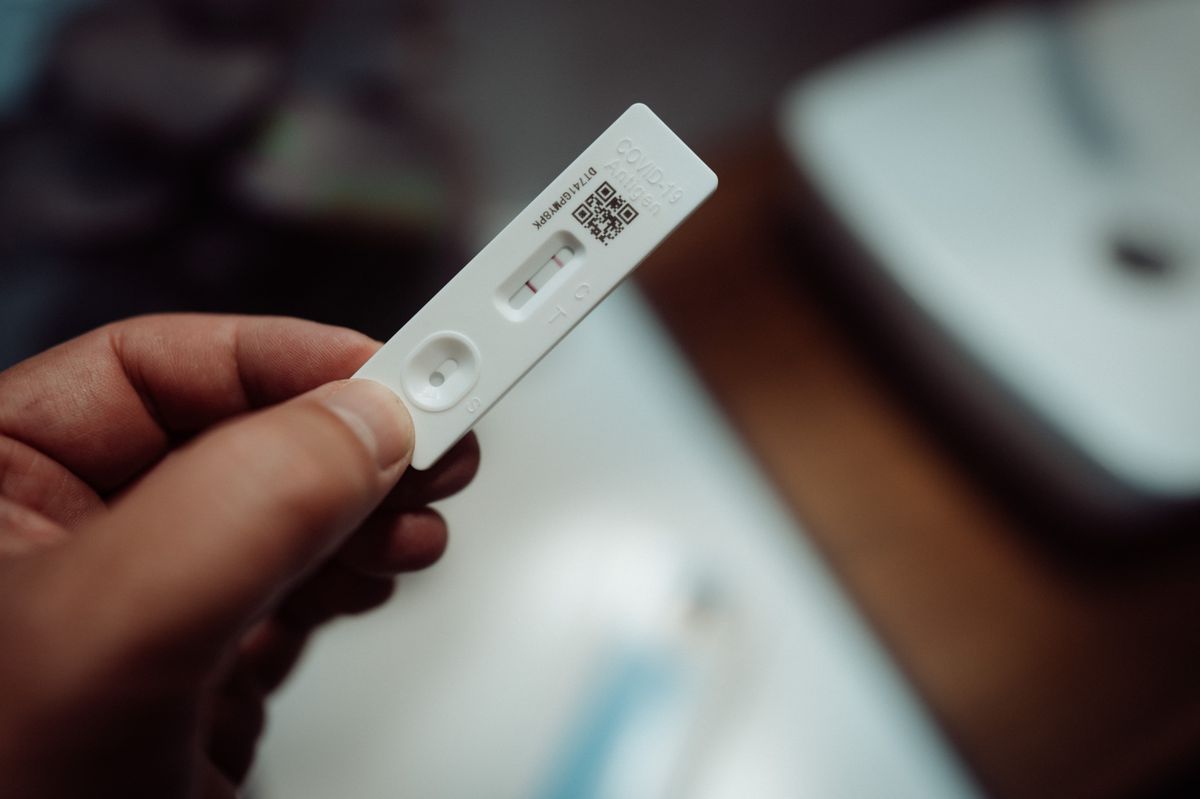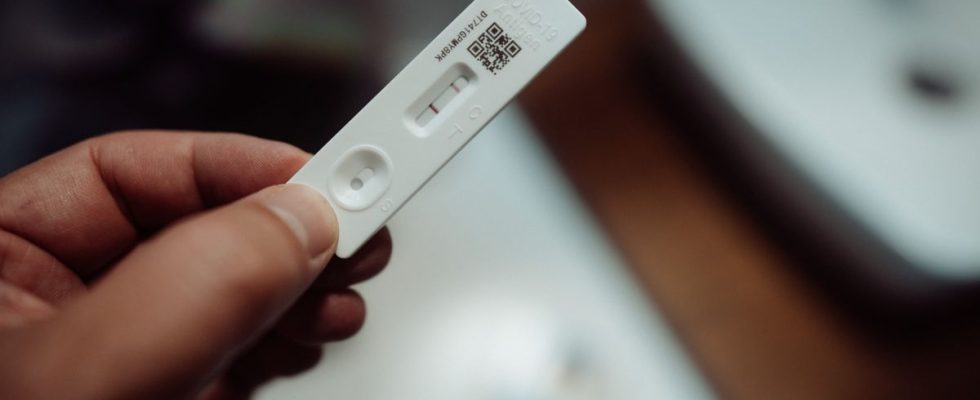Published
aftermathThis is what a corona infection does to your immune system
As soon as the acute Covid infection is over, some people lie flat again. For some people, one infection follows the next. Why is that?
- from
That’s what it’s about
Immediately after a Covid infection, people often quickly become ill again.
This may be because the immune system is still weakened or because it is not yet ready for a new pathogen.
The so-called immune gap can also play a role, but so can an autoimmune disease triggered by the corona infection or a reactivated virus that was previously dormant in the body.
However, there is no evidence of permanent immune deficiency.
Sick after Covid-19? This happens, as the experiences of Samia Hurst, among others, show. The Swiss bioethicist, who was vice president of the Swiss Corona task force, which was dissolved in March 2022, explained on Tiktok at the beginning of December that she was really flat shortly after her corona infection: high fever, muscle cramps and hardly any strength to get out of bed ( see video). In the comments she writes that she probably had bacterial pneumonia. The worst was over after about a week, but it took a good month to get back on your feet. Your conclusion in the video description: “Covid-19 weakens the immune system. We should get it as rarely as possible.”
But does the virus really weaken the immune system? And if so: for how long? Or do other factors play a role?

The second line shows: There is a Covid-19 infection.
Unsplash
Covid-19 actually challenges the immune system even longer
After the acute infection has subsided, the immune system is far from finished. On the one hand, it has to clean up what the virus has left in the body and repair what it has damaged. On the other hand, it performed at high levels during the infection. Accordingly, it is done and needs to recover.
It is not possible to say in general terms how long the immune system needs for the processes described. That depends, among other things, on the course. The following applies: the more severe the infection, the longer it takes the immune system to be as efficient as it was before the illness, explains Sylvia Kerschbaum-Gruber, molecular biologist at the Med-Uni Vienna, to “Der Standard”. Depending on the study, normalization of various aspects of the immune response in people without severe disease can take between six and twelve months. Sometimes there is talk of two to four months. Other factors such as previous illnesses, age and genetic aspects also play a role.
It is impossible to say whether normal conditions will be achieved again in all cases. But this is not a peculiarity of Covid-19, it is also known from influenza. “Covid is simply much more common,” says Kerschbaum-Gruber. That is why the susceptibility to infection of those who have just recovered is more noticeable.
This is how the immune system works
If a pathogen enters the organism, the innate immune system, which fights the intruder in a very non-specific and broad manner, reacts first, including with inflammatory reactions. Then the acquired (adaptive) immune system becomes active. It reacts in a specialized way to individual pathogens and remembers them for the future. The next time they come into contact, they are prepared and can react quickly and effectively.
That’s why after a viral infection you are more susceptible to other infections
If the human organism comes into contact with a pathogen while the immune system is weakened and is still dealing with the consequences of the infection it has just overcome – be it Covid-19 or another viral infection such as influenza – it has an easy time of it, so to speak. An infection can then occur that the body would otherwise have easily fought off. Diseases that are actually harmless can also become more serious. This is because the defense is busy with something else. Experts refer to such diseases as opportunistic infections because the pathogens responsible for them use the favorable opportunity – the temporary weakness of the immune system – to multiply. This means that a respiratory disease caused by a virus, such as Covid-19, is followed by bacterial pneumonia, for example, as apparently happened with Samia Hurst. Such an additional infection is also called superinfection.
Weakened immune systems awaken dormant diseases
During the temporary weakening, so-called persistent viruses – that is, viruses that are dormant in our body – can become active again. These include the varicella-zoster virus. This is present in the nerve cell nests of the spinal cord in almost everyone who has ever had chickenpox. The temporary weakening of the immune system can cause it to reactivate and cause shingles. The Epstein-Barr virus is also such a candidate. “This reactivation or persistence triggers ongoing activation of the immune system,” says Kerschbaum-Gruber. But this is not a damage to the immune system per se, but rather a normal immune reaction.
The immune gap thing
The so-called immune gap could also play a role. This happened because the Corona measures were very successful in preventing droplet infections. As with Covid, their pathogens also change. However, slower. So a person who had a cold in 2018 had a good chance of being immune to the same strain in 2019 because it was similar to the 2018 version. Since many infections did not occur due to the measures, the pathogens were able to develop further without us being able to produce antibodies that protect against the variants that are now circulating. In addition, the antibodies that our body produces after an infection decrease over time. Accordingly, our susceptibility to droplet infections is now higher. The role of this immune gap is sometimes hotly debated. Because very few people were completely isolated, i.e. far from any pathogens, even during the peak phase of the pandemic.
Type 1 diabetes after Corona
The immune system usually recovers after an infection, but there are lasting consequences: autoimmune diseases. Research shows that such diseases can occur even after mild corona infections and are directly linked to Sars-CoV-2. Covid-19 disease can lead to diabetes, as a study involving the University of Basel shows. This is because the virus attacks the insulin-producing cells in the pancreas. Meanwhile, other teams are investigating whether there is a connection between Covid-19 and other autoimmune diseases such as Hashimoto’s thyroiditis, rheumatism or Graves’ disease.
No evidence of permanent immune deficiency
According to Kerschbaum-Gruber, there is no evidence that Corona can lead to permanent immune deficiency, as can sometimes be read on social media. Urs Karrer, an infectious disease specialist at the Winterthur Cantonal Hospital, also sees no evidence that a Covid infection permanently suppresses the immune cells, as he said at the beginning of 2023 NZZ said. Onur Boyman, an immunologist at the University Hospital of Zurich, has the same opinion. He told Spektrum.de in February: “Sars-CoV-2 does not cause immune deficiency. In the long term, all we see in those who have recovered is the consequences of what can sometimes be a very intensive fight against their immune system.”
What does this mean for those who have recently recovered from Covid-19?
You should take it easy at first and, for example, not start exercising again straight away. The virus can attack the heart and cause myocarditis. This is an infectious myocarditis that can also be triggered by cold and flu viruses. If left unnoticed, this can lead to heart failure or even sudden cardiac death. How long you should wait depends on the acute course. The recommendation after mild cases is: Do not train if you have symptoms and pause from exercise for three consecutive symptom-free days before restarting. If the course is moderate or even severe, medical advice should be sought.
Taking time to recover is worth it: once myocarditis has developed, those affected have to take a break from sports for three to six months.
Knowledge push
Subscribe to Knowledge Channel notifications in the 20-minute app. You will be informed about groundbreaking research findings and discoveries, explanations of current events and curious news from the wide world of science. You will also receive answers to everyday questions and tips for a better life.
Here’s how to do it: Install the latest version of the 20-minute app. Tap the settings menu in the top right (three lines with a circle), then “Settings” and finally “Push notifications”. Select the topics you want and then click “Next”. Now select a region if desired and click “Next”. Under “Topics” you can now select “Knowledge”. Click “Confirm” and you’re in!
Have you been following on Whatsapp for 20 minutes?
Stay informed and subscribe to the 20 Minutes WhatsApp channel: Then you will receive an update with our most moving stories directly to your cell phone in the morning and evening – hand-picked, informative and inspiring.

